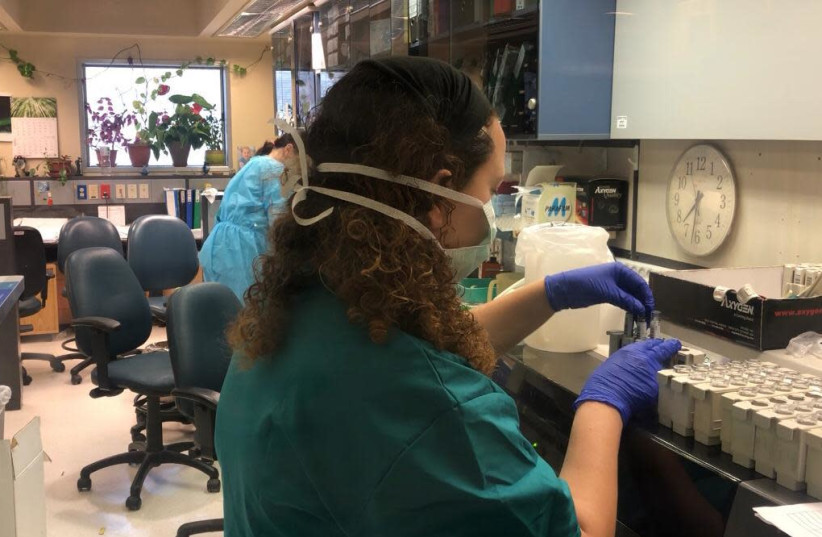
Israel’s Hadassah Medical Center is in negotiations to test the Russian Sputnik V vaccine and to potentially manufacture and distribute it in the Jewish state, The Jerusalem Post has confirmed.
Dr. Polina Stepensky, chairman of the Department of Bone Marrow Transplantation & Cancer Immunotherapy of Adults and Children at Hadassah, told the Post that “we are in negotiations” specifically to take part in the vaccine’s upcoming Phase III trial and to establish a production facility so that the vaccine would be available to Israelis if it proves safe and effective.
The Health Ministry confirmed that it is aware of the negotiations, but did not say whether it would authorize the trials.
“Both as a doctor and scientist, I think that they have developed a really wonderful thing,” Stepensky said, noting that she herself would be willing to get a shot of the vaccine. “From a scientific approach, it is in my eyes a good approach. We want to collaborate so that we can learn and understand more.”
Earlier this month, Hadassah Medical Center chief Zeev Rotstein told the Post that Russia was recruiting hospitals to collaborate in the clinical trials, and Hadassah’s branch in Skolkovo, Moscow’s self-styled Silicon Valley, had volunteered.
On August 11, Russia’s Gamaleya Research Institute of Epidemiology and Microbiology registered the world’s first novel coronavirus vaccine, naming it Sputnik V after the first artificial satellite, which was considered to have reinvigorated space research around the world.
The development of the vaccine was supported by the country’s Defense Ministry and the Russian Direct Investment Fund.
When Russia made its announcement, many countries expressed skepticism and concern over the vaccine, because it had been approved by the Health Ministry to be administered to the highest risk population and had not yet completed Phase III clinical trials. Such a trial is considered essential for proving that a new product is safe and effective for the purpose intended.
Moreover, the data from Sputnik V’s Phase I and Phase II trials, which were completed on August 1, have not yet been published in peer-reviewed scientific journals. Gamaleya’s director Alexander Gintsburg, however, said during a press briefing on Thursday that they were expected to be published even before the end of the month.
Pre-clinical trials were already completed on on animals. During the briefing, Gamaleya’s deputy director for scientific work, Denis Logunov, said the vaccine had been tested on hamsters, mice, guinea pigs, rats, rabbits and two types of primates, that “no unforeseen or unwanted side effects were observed” and that it induced a strong antibody and cellular immune response.
Logunov argued that the Russian Health Ministry’s decision to allow the virus to be given to the most at-risk population “does not set us free to do anything we want.” Gintsburg said that it “is completely ethical and adequate.”
There are around 200 novel coronavirus vaccines currently in development around the world. They can be classified into four main categories: viral vector-based vaccines, virus based, nucleic-acid-based and protein-based, a new Sputnik V website explains.
The Russian vaccine is viral-vector based. A vector is a virus that lacks a gene responsible for reproduction and is used to transport genetic material from another virus that is being vaccinated against into a cell.
Specifically, the company took two strains of human adenovirus, Ad5 and Ad26, from which they genetically removed the part that is responsible for virus replication, and inserted a gene with the code of a protein from another virus spike in its stead. This new element is what triggers an immune response, causing the body to produce antibodies that protect the recipient for infection.
The vaccine is administered in two doses, 21 days apart.
Human adenoviruses are not new. And, according to the Sputnik V website, more than 350 scientific studies have been done and published in various sources around the world concerning the creation of adenovirus vectors. The Gamaleya Institute has been working on adenoviral vector-based vaccines since the 1980s.
Hadassah’s Stepensky differentiated Sputnik V from the vaccine candidates being developed by Oxford University/AstraZeneca and Moderna, which are based on technologies that have never been used in approved vaccines before. As such, added Logunov, no long-term studies have been conducted on the possible side effects of such technologies for the human body.
Human adenoviral vectors are being tested in the vaccines being developed by CanSino in China (Ad5) and Johnson & Johnson in the US (Ad26).
The Phase III, randomized, double-blind, placebo-controlled multicenter clinical study of Sputnik V is expected to commence next week, said Russian Direct Investment Fund CEO Kirill Dmitriev during the briefing. Some 40,000 people in Russia, Saudi Arabia, United Arab Emirates and Brazil will take part in the study. He said that Gamaleya and RDIF were “in negotiations with several other partners” as well.
Dr. Rivka Abulafia-Lapid, a senior virology lecturer at the Hebrew University of Jerusalem, told the Post that “it sounds like it is not a bad vaccine” and that, “since the packaging adeno and the mechanism is already in use and was applied for a MERS and Ebola vaccine, it looks promising.” However, she said Sputnik V should not have been authorized for use under any circumstances without the completion of the Phase III trial, which could take as long as six months.
“I think it was a rush; I will not accept it now,” she said. “Shortcuts can be very dangerous for people.”
Stepensky, however, pushed back. She said that if there is any hesitation from Israel about partnering on the Russian vaccine, it is for “political and not medical” reasons.
Bagikan Berita Ini














0 Response to "Hadassah negotiating to test, manufacture Sputnik V vaccine in Israel - The Jerusalem Post"
Post a Comment